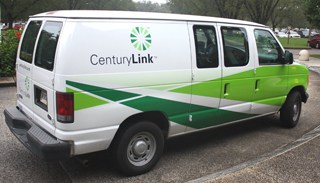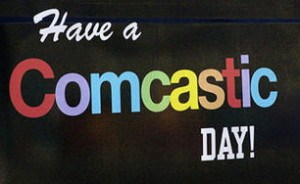
CenturyLink announces their own Internet Overcharging scheme; customers call to cancel their service.
CenturyLink is quietly introducing usage caps for its broadband customers that will limit residential customers to between 150-250GB of usage per month.
The Internet Overcharging scheme was inserted into the company’s High Speed Internet Service Management disclosure page, and suggests heavy users are using an inappropriate amount of data, slowing down the network for other users:
The majority of CenturyLink High-Speed Internet customers make great use of their service and comply with the CenturyLink High-Speed Internet Subscriber Agreement. An extremely small percentage use their service excessively, or at such extreme high volumes, that they violate the terms of their CenturyLink High-Speed Internet Subscriber Agreement. While this high volume use is very rare, CenturyLink is committed to helping these customers find a high-speed Internet solution to better meet their needs.
CenturyLink is announcing the following Excessive Usage Policy (EUP), which will become effective in February 2012:
CenturyLink’s EUP applies to all residential high speed Internet customers and is only enforced in the downstream (from Internet to customer) direction. Video services provided by CenturyLink PRISM™ TV are not subject to the usage limits. The policy has the following usage limits per calendar month:
- Customers purchasing service at speeds of 1.5Mbps and below, have a usage limit of 150 Gigabytes (GB) of download volume per month.
- Customers purchasing service at speeds greater than 1.5Mbps, have a limit of 250GB in download volume per month.
There are no overage charges or metering fees for usage as part of the Policy.
The company exempts their own video service PRISM TV from the scheme.
“It’s another CenturyLink ripoff in action, and despite their claims that they treat all data the same, they certainly do not,” says CenturyLink customer Rob Cabella. “Their video programming is sent from local facilities, as data, down the same pipe as their broadband service, yet they conveniently leave their TV product out of the usage cap equation.”

Prism customers can watch unlimited TV, but face limited broadband usage over the exact same pipeline.
Cabella says PRISM operates much like AT&T’s U-verse. Fiber provides service into individual neighborhoods and then standard copper phone lines deliver service the rest of the way to customer homes.
“It’s one pipe they divide up for video, phone, and Internet, but they are protecting their video service by limiting broadband use while leaving their television and phone service completely unlimited,” Cabella says. “Video is the biggest bandwidth hog of all, and CenturyLink invites you to watch as much as you want, as long as it comes from them.”
Cabella thinks the very fact CenturyLink is offering unlimited video disproves their argument about ensuring appropriate levels of broadband usage.
“Their local facilities get overloaded to the point where they temporarily stop signing up customers, yet it’s a video free-for-all, as long as you get your video from ‘the right place’ and that sure isn’t Netflix or Hulu,” Cabella notes.
CenturyLink’s limits will apply to broadband customers signed up for PRISM or the company’s traditional DSL service. Uploads will not count against the cap.
For the moment, overlimit fees will not be charged and the company will send warning letters to offenders that invite customers to migrate “to a higher speed if available or to a business grade data service that better fits their bandwidth usage.”
Customers who repeatedly exceed their usage limits after being notified may have their service discontinued.
Cabella isn’t waiting.
“I called my local cable company which still offers unlimited service and signed up this morning,” Cabella says. “CenturyLink didn’t even know what I was talking about when I called and said their website must have been hacked or in error. Why would I want to do business with a company that doesn’t even have a clue what their own business is doing? Goodbye CenturyLink.”


 Subscribe
Subscribe




